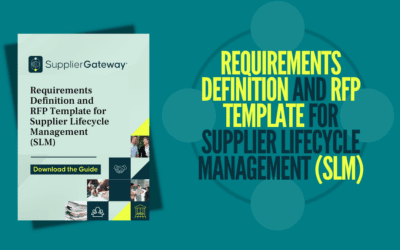You know how important it is to find suppliers for your commercial real estate projects. But did you also know that correctly onboarding and offboarding those suppliers can make or break the success of your projects?
As a procurement pro in the real estate world, you deal with constantly moving parts, and suppliers are a huge part of keeping all those parts running smoothly. You know you have to be strategic about bringing on new suppliers and ending relationships with those that no longer suit your needs.
This guide will walk you through best practices for onboarding new suppliers and includes tips for offboarding suppliers at the end of a project. Following these recommendations will help you build better relationships with suppliers, avoid costly mistakes, and gain efficiencies that boost your bottom line. Read on to learn how to master the art of supplier onboarding and offboarding.
The Benefits of Effective Commercial Real Estate Supplier Onboarding
As a commercial real estate developer, effective supplier onboarding should be a top priority for your procurement team. There are many benefits to having a strong supplier onboarding program:
- Faster time to value. With an efficient onboarding process, your new suppliers can deliver value immediately. No more waiting weeks or months while they try to figure things out.
- Improved compliance. A good onboarding program and platform help ensure suppliers meet all your compliance requirements from the start. You can capture compliance information, like insurance certificates, quality certifications, and data privacy standards up-front instead of rushing to get them later.
- Reduced risk. Onboarding suppliers thoroughly helps avoid issues like delayed projects, poor work quality, data breaches, and fraud. You’ll have confidence in your supplier’s abilities and trust in the partnership.
- Cost savings. An optimized onboarding process saves your team time and money. No more chasing down supplier information or fixing data entry mistakes. This helps suppliers hit the ground running, which helps projects stay on budget.
- Stronger relationships. Taking the time to properly onboard suppliers shows you value them and the partnership. This goodwill fosters collaboration and a shared commitment to success. Suppliers will appreciate your professionalism and be motivated to deliver.
The benefits of effective supplier onboarding for commercial real estate developers are clear. With the right process and technology, you can onboard suppliers faster, ensure compliance, reduce risk, cut costs, and build better partnerships. Now that’s a solid foundation for success.
Steps to Streamline Your Commercial Real Estate Supplier Onboarding Process
Streamlining your supplier onboarding process is key to saving time and money. With tools like SupplierGateway’s Supplier Onboarding and Offboarding Platform, you can onboard new suppliers up to 700 times faster.
Following the suggestions below will help you to further reduce the time and cost involved with onboarding new suppliers:
- Automate as much as possible. Use a supplier onboarding and offboarding platform that allows suppliers to self-serve by entering information directly into online forms. This eliminates the need for manual data entry for you and reduces errors since the supplier fills in the information themselves.
- Make information easy to find. Have a centralized repository for all supplier documentation, contracts, insurance information, and communication. Your team and suppliers should be able to access everything in one place.
- Standardize your processes. Create templates and workflows for repeatable forms and contracts. Checklists and workflows in your onboarding platform guide suppliers through the required steps and ensure all forms are complete.
With automated tools, standardized processes, and a centralized repository, you’ll be onboarding new suppliers faster than ever. When it’s time to offboard, you’ll have a system in place. When you streamline supplier onboarding and offboarding, your procurement team and bottom line will reap the benefits.
Managing Supplier Relationships and Performance
Once you have onboarded your suppliers, the real work begins—managing supplier relationships and ensuring strong supplier performance. As a commercial real estate developer, staying on top of suppliers is critical to keeping your projects running smoothly and on budget.
Here are the basics for managing your supplier relationships:
Communicate Regularly
Make time for consistent calls, emails, and in-person meetings with key suppliers. Discuss current projects, potential issues, and ways to improve the working relationship. Listen to any concerns the suppliers may have and address them promptly. Open communication and quick response times build trust and help avoid surprises later on.
Conduct Performance Reviews
Reviews of key suppliers should be conducted annually at a minimum. These reviews evaluate their performance, quality, responsiveness, and value. Compare actual performance to the agreed upon contract or service level agreement. Discuss positives and opportunities for improvement, setting clear expectations for the next review period. Consider putting suppliers on a performance improvement plan or terminating the relationship if performance does not improve.
Provide Feedback
Don’t just evaluate suppliers—give them constructive feedback they can act on. Explain what they’re doing well and how they can improve. Ask for their input on how your organization can improve the working relationship as well. Continuous feedback and a willingness to listen on both sides will strengthen partnerships in the long run.
Resolve Issues
Despite best efforts, problems can still arise. Develop a clear issue resolution process, including escalation steps, to address issues quickly and minimize impact. Be proactive by anticipating potential issues before they occur. Discuss possible scenarios and solutions with suppliers to build alignment on the appropriate path forward in the event of a problem.
Maintaining open communication, conducting regular reviews, providing constructive feedback, and having a solid issue-resolution process will help ensure successful long-term relationships with your suppliers. Strong supplier management is essential for keeping your real estate development projects on track.
Best Practices for Commercial Real Estate Supplier Offboarding
When it’s time to part ways with a supplier, you need an easy way to terminate contracts, disable system access, and archive records. Offboarding checklists provide a structured process for a clean break.
Have a Transition Plan
A well-defined exit strategy for offboarding suppliers is critical for completing the supplier lifecycle properly. Work with your procurement team to determine how long the offboarding process will take and implement a comprehensive transition plan. Consider the following when offboarding suppliers:
- Will their work or services be transitioned to a new supplier or brought in-house? Ensure the transition does not affect your company’s productivity or services.
- What data, files, logins, tools, or other assets do they have access to that need to be transferred or revoked? Safeguard your company’s digital infrastructure.
- How will you handle any remaining financial obligations or payments still owed to the supplier? Tie up any loose ends.
Communicate Clearly
Once you have a transition plan, be upfront and transparent in communications with the supplier about the offboarding process and timeline. Explain the reasons for ending the relationship and provide specific details on the next steps. Be available to answer any questions they may have.
- Schedule a call or meeting to personally deliver the news if possible. Don’t just send an email.
- Share the key milestones and deadlines in the transition plan. Let them know what is expected of them and by when.
- Express appreciation for their partnership and work. Even though the relationship is ending, you want to remain professional.
Monitor Progress and Provide Feedback
As the offboarding progresses, closely monitor the supplier’s work and transition efforts. Provide feedback and guidance as needed to keep things on track. Conduct regular check-ins to identify any roadblocks or issues right away. You want the offboarding to go as smoothly as possible.
Offboarding suppliers the right way is just as important as onboarding them. Using best practices for supplier offboarding will help ensure a cleanly-ended relationship with the supplier. While ending a supplier relationship can be complicated, you can navigate it efficiently and secure your company’s interests.
Conclusion
When you invest the time to create a commercial real estate supplier onboarding and offboarding program, you set your projects up for success. Your suppliers feel valued and motivated to perform at their best, and you have confidence in their ability to deliver according to your standards and timelines.
While the processes may require effort upfront, the long-term payoff is worth it. Your projects will run more efficiently, stay on budget, and meet quality expectations. Your company will also build a reputation as a preferred client that suppliers want to work with, giving you access to the best resources and pricing.
When you prioritize supplier onboarding, management, and offboarding, you’ll quickly see the benefits to your bottom line and peace of mind. Find out how SupplierGateway can help your organization with supplier onboarding and offboarding by scheduling a demo!











